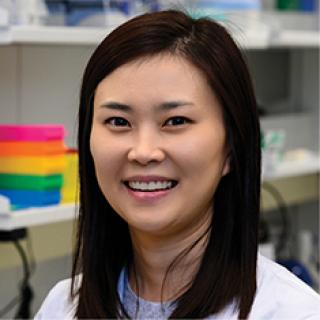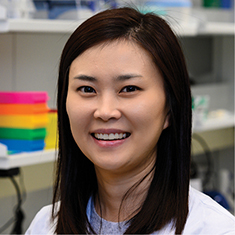
Euna Yoo, Ph.D.
- Center for Cancer Research
- National Cancer Institute
- Building 538, Room 246
- Frederick, MD, 21702-1201
- 301-228-4546
- euna.yoo@nih.gov
RESEARCH SUMMARY
Our goal is to discover novel chemical approaches and molecules that can address immunological problems in cancer therapy. Our research applies and advances chemical proteomics to develop new strategies to study and manipulate the human immune system. We use natural product screening and synthetic chemistry to develop chemical probes that specifically detect and perturb key regulators of biochemical and signaling pathways and functional enzymes involved in immune activation and tolerance.
Areas of Expertise

Euna Yoo, Ph.D.
Research
Chemoproteomic profiling using natural product-inspired probes
More than 7% of our genes encode proteins involved in the immune system. Yet, many of the processes underpinning the immune response still remain poorly understood. By applying and advancing chemoproteomic platforms combined with high-throughput and phenotypic screenings, we aim to discover functionally and therapeutically relevant target proteins for the development of immunomodulatory agents. Our approach is to use activity-based protein profiling (ABPP) with a range of chemical scaffolds, including protein-reactive natural products and covalent ligands. Particularly, electrophilic natural products that bind and covalently modify their targets through reactive functional groups offer ideal starting points for the development of chemical probes and facilitate the identification of their biological binding partners. Future goals of this project include understanding biological mechanisms of immunomodulators in the treatment of cancer and development of novel cancer immunotherapy.
Activity-based probes and inhibitors for proteases in immunity
Proteases are common constituents of endolysosomal compartments and play key roles in pathogen recognition, elimination, signal processing, and cell homeostasis in immune cells. Our research focuses on the development of chemical tools that allow kinetic and dynamic measurement of the network of protease activities. The major goal of this project is to study functional roles of proteases and how they are implicated in disease development and progression and ultimately provide potential therapeutic agents.
Chemical approaches for targeted and controlled activation of immune signaling
We are interested in understanding molecular and chemical codes that shape the immune responses. Our approach to this task is to develop methods that control the activation of specific immune cell subsets temporally and spatially and visualize the interaction of tissue-resident immune cells with their surroundings. We use a chemical caging approach combined with conjugation for localized activation of innate immune receptors and signaling.
Publications
- Bibliography Link
- View Dr. Yoo's Complete Bibliography at NCBI
Biography

Euna Yoo, Ph.D.
Dr. Yoo received an undergraduate degree in Pharmacy from Ewha Womans University in 2007. At Ewha, she worked with Prof. Hea-Young Park Choo and continued to pursue a Master’s degree in the area of medicinal chemistry studying serotonergic receptor antagonists. After receiving her M.Sc. in 2009, she moved to the University of Kansas and obtained a Ph.D. from the Department of Medicinal Chemistry under the mentorship of Prof. Sunil David in 2015. During her graduate studies, she performed research on the synthesis and biological evaluation of Toll-like receptor agonists as potential vaccine adjuvants. She then joined the laboratory of Prof. Matthew Bogyo at Stanford University. Her research as a postdoctoral fellow focused on the development of activity-based probes and covalent inhibitors to study the functional roles of proteases. She joined the Chemical Biology Laboratory in 2019 as a Stadtman Investigator.
Job Vacancies
We have no open positions in our group at this time, please check back later.
To see all available positions at CCR, take a look at our Careers page. You can also subscribe to receive CCR's latest job and training opportunities in your inbox.
Team
News
Learn more about CCR research advances, new discoveries and more
on our news section.

